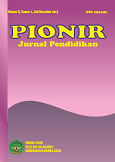PENGARUH MODEL PEMBELAJARAN COOPERATIVE LEARNING TIPE STUDENT TEAMS ACHIEVEMENT DIVISION (STAD) TERHADAP HASIL BELAJAR IPS SISWA KELAS V
DOI:
https://doi.org/10.22373/pjp.v11i3.15307Keywords:
Cooperative Learning, Student Teams Achievement Division, Learning Outcomes, Social Studies.Abstract
The learning process at SDN Mangun Jaya 01 has not implemented an interactive learning model for students because during the learning process it still uses monotonous and conventional learning, resulting in low learning outcomes. The purpose of this study was to determine the effect of the cooperative learning model type Student Teams Achievement Division (STAD) on the learning outcomes of social studies students of class V. In this study, the approach used by the researcher was experimental quantitative and the research method used was True Experimental and the design used was Post-test Only Control Group Design. Sampling using saturated samples using classes VA and VB, then the entire population in classes VA and VB will be used as research samples. The instrument in this study was a multiple choice test sheet. Analysis of learning outcomes using t test. Based on the results of the analysis obtained > = 2,699 > 2000 so that is accepted and is rejected. So it can be concluded that there is an effect of the Cooperative Learning learning model Type Student Teams Achievement Divisions (STAD) on Social Studies Learning Outcomes for Class V students.References
Amris, dkk. “Pembelajaran Tematik Terpadu Menggunakan Model Problem Based Learning Di Sekolah Dasar.” Jurnal Basicedu, 2021.
Cahyaningsih, dkk. “Upaya Peningkatan Menulis Teks Persuasi Menggunakan Metode STAD Pada Siswa SMP.” Parole: Jurnal Pendidikan Bahasa dan Sastra Indonesia, 2019.
Ihsan, dkk. “Pengaruh Model Pembelajaran Kooperatif Tipe STAD Terhadap Hasil Belajar IPS Pada Siswa Kelas IV Di SDN Inpres Sangiang WerA.” JUPE : Jurnal Pendidikan Mandala, 2022.
Insiyah & Rukmana. “Pengaruh Model Pembelajaran STAD Berbantuan Media Plotagon Terhadap Keaktifan dan Hasil Belajar IPA Siswa Kelas V SD.” Pionir : Jurnal Pendidikan, 2022.
Israil & Isnawati. “Implementasi Model Pembelajaran Cooperative Learning Tipe STAD Untuk Meningkatkan Motivasi Belajar Siswa Dalam Pembelajaran IPA Di SMP Negeri 1 Kayangan.” Jurnal Kependidikan: Jurnal Hasil Penelitian dan Kajian Kepustakaan di Bidang Pendidikan, Pengajaran dan Pembelajaran, 2019.
Jamilah. “Meningkatkan Hasil Belajar PKn Siswa Kelas VI Melalui Implementasi Kooperatif Learning Di SDN Alasrajah 1 Kecamatan Blega Kabupaten Bangkalan.” INETRAKSI: Jurnal Kependidikan, 2019.
Putri, dkk. “Pengaruh Metode Pembelajaran STAD Terhadap Hasil Belajar Matematika pada Siswa Kelas VIII.” Mosharafa: Jurnal Pendidikan Matematika, 2018.
Rijal, F. (2018). Guru profesional dalam konsep kurikulum 2013. Jurnal MUDARRISUNA: Media Kajian Pendidikan Agama Islam, 8(2), 328-346.
Rijal, F., Nudin, B., & Samad, I. A. (2022). LEARNING INNOVATION OF ISLAMIC RELIGIOUS EDUCATION AT MTsN MODEL IN ACEH. AL-ISHLAH: Jurnal Pendidikan, 14(2).
Saputra, dkk. “Pengaruh Motivasi Terhadap Hasil Belajar Siswa SMK.” INVOTEK: Jurnal Inovasi Vokasional Dan Teknologi, 2018, doi:10.24036/invotek.v18i1.168.
Sutarna, dkk. “Pengaruh Model Pembelajaran Bamboo Dancing (Tari Bambu) terhadap Hasil Belajar IPS Siswa SDN 1 Cipedes.” Pendas : Jurnal Ilmiah Pendidikan Dasar, 2018.
Syachtiyani, dkk. “Analisis Motivasi Belajar dan Hasil Belajar Siswa di Masa Pandemi COVID-19.” Prima Magistra: Jurnal Ilmiah Kependidikan, 2021, doi:10.37478/jpm.v2i1.878.
Tanjung. “Hubungan Minat Belajar dan Motivasi Belajar dengan Hasil Belajar Matematika pada Siswa Kelas V di MIS Nurul Hikmah Ujung Padang.” Pionir: Jurnal Pendidikan, 2022.
Wiyoko, dkk. “Analisis Pelaksanaan Pembelajaran Tematik Melalui Model Contextual Teaching and Learning (Ctl) Kelas III Sekolah Dasar Di Era Pandemi Covid.” Jurnal Dimensi Pendidikan dan Pembelajaran, 2021.
Yulia, dkk. “Model Pembelajaran Kooperatif Learning.” Snipmd, 2020.
Zahro, dkk. “Pengaruh Model Pembelajaran Student Team Achievement Devision (STAD) Dan Mind Mapping Terhadap Hasil Belajar Siswa Kelas IV Sekolah Dasar.” Premiere Educandum : Jurnal Pendidikan Dasar dan Pembelajaran, 2018.
Downloads
Published
Issue
Section
License
- Authors retain copyright and grant the journal right of first publication with the work simultaneously licensed under a Creative Commons Attribution License that allows others to share the work with an acknowledgment of the work's authorship and initial publication in this journal.
- Authors are able to enter into separate, additional contractual arrangements for the non-exclusive distribution of the journal's published version of the work (e.g., post it to an institutional repository or publish it in a book), with an acknowledgment of its initial publication in this journal.
- Authors are permitted and encouraged to post their work online (e.g., in institutional repositories or on their website) prior to and during the submission process, as it can lead to productive exchanges, as well as earlier and greater citation of published work (See The Effect of Open Access).

